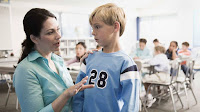Students on the Autism Spectrum: Strategies that Can Guarantee Their Academic Success

In an ideal world (which none of us will ever experience), your child’s educational experience would include the strategies listed below, all of which will optimize the potential for academic success – intellectually, emotionally and socially. Strategies that can guarantee the success of kids with High-Functioning Autism (HFA) and Asperger’s (AS) include the following: 1. In an ideal world, the HFA or AS youngster’s school has an extensive, in-depth knowledge of autism spectrum disorders (e.g., principal, vice principal, dean, teachers, administration staff, etc.). This guarantees that whoever has contact with your youngster in the course of the school day is aware of his or her needs and understands that the disorder is neurobiological in nature – and not a behavioral issue. So, ask what specific training the staff at your youngster’s school has had, and check that this is updated regularly. This is particularly relevant for your child’s classroom teacher. If no specific trai

